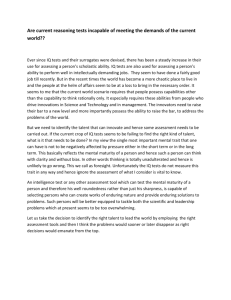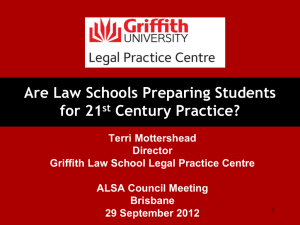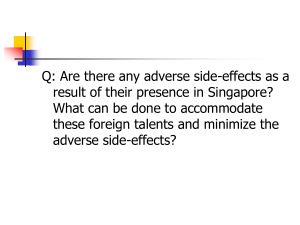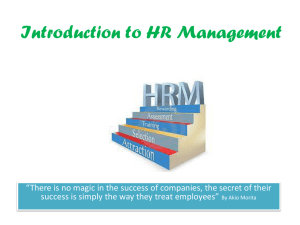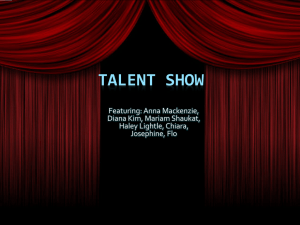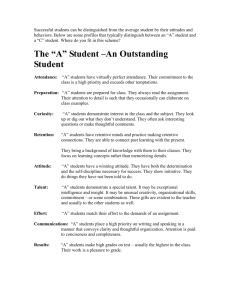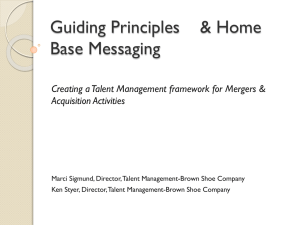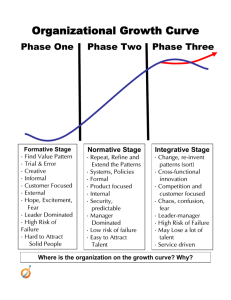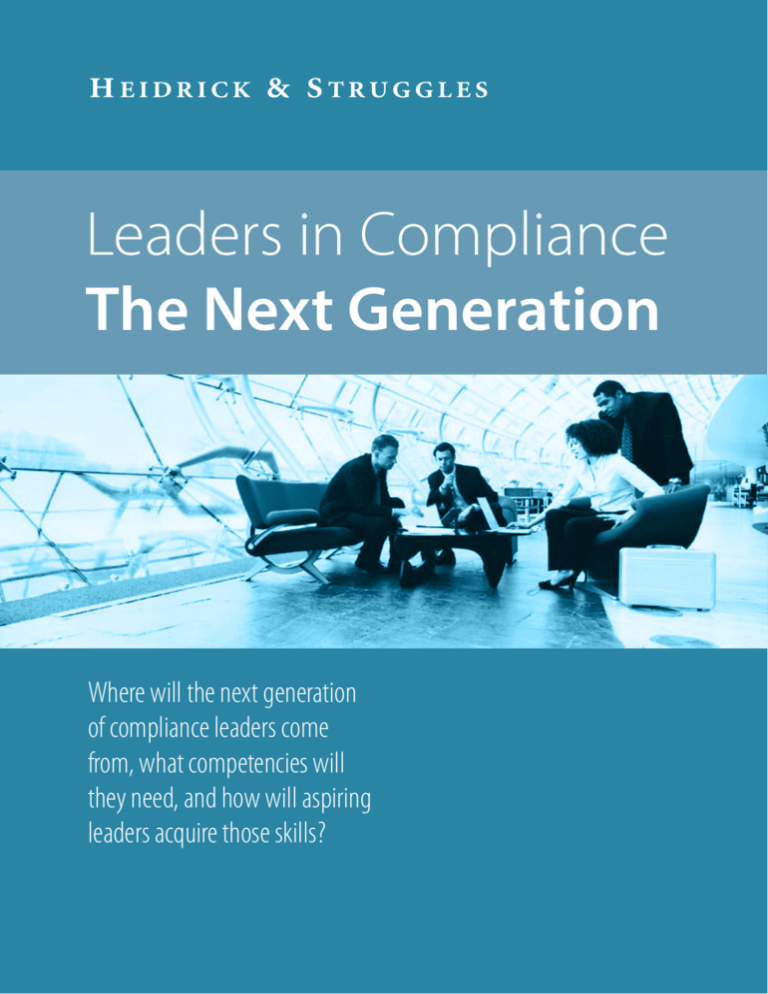
Leaders in Compliance
The Next Generation
Where will the next generation
of compliance leaders come
from, what competencies will
they need, and how will aspiring
leaders acquire those skills?
Leaders in Compliance
The Next Generation
Sharply rising demand for compliance
additional professionals, in a variety of disciplines, who
talent, the absence of a clear career path
organizations.
can make compliance a central concern at all levels of their
in the discipline, and greater need for
Some formidable obstacles stand in the way of meeting
compliance executives with leadership
this demand. Because there has been no traditional career
and influencing skills are creating difficult
path for working in compliance, few guidelines exist for
challenges for organizations seeking to
in the function, and what competencies augur success.
what to look for in a candidate, how to pursue a career
identify and retain talent in a world of
In addition, most graduate business schools and law
increasing regulation.
the subject, and students pondering their careers have
Where will the next generation of compliance leaders
schools have not offered classes specifically focused on
regarded the field as a back-office function.
come from, what competencies will they need, and
To discuss perceptions of the role and the state of the
how will aspiring leaders acquire those skills? To further
compliance leader today, Heidrick & Struggles convened
explore these topics we convened top representatives
a roundtable discussion that included Chief Compliance
from leading global banks, financial services companies,
Officers (CCOs) and other senior compliance executives
insurance organizations, business schools and law schools
from leading financial institutions and representatives
to discuss careers in compliance and the factors essential
from leading business schools and law schools. Prior to
for success.
attending the event, “Leaders in Compliance: The Next
Since the financial crisis of five years ago, increased
regulation around the world has been driving demand for
compliance professionals. In the wake of the Dodd-Frank
Act and other regulation, many organizations have had to
comply with complex new rules governing banking, the
derivatives market, foreign tax accounting, and more. And
with many regulations still under construction, and others
scheduled to go into effect soon, more implementation
challenges lie ahead – and thus more demand for
Generation,” participating CCOs and General Counsels
completed a survey about the sourcing of compliance
talent in their organizations and the competencies
required for success. Taken together, the results of the
survey and the candid discussion at the event paint a
mixed picture of both challenge and opportunity:
•
Compliance roles are in a pronounced state of flux.
•
Softer skills like leadership, influencing, and
relationship building are emerging as key
compliance talent.
Meanwhile, serious and widely publicized compliance
breaches, followed by massive fines and pledges to
competencies for success in those roles.
•
to better prepare their students for careers in
improve performance, have forced many institutions
compliance.
to take a hard look at operationalizing compliance and
deciding who in their organizations will lead the charge.
Law schools and business schools have an opportunity
•
Identifying candidates for top compliance roles
This suggests, too, that in order to achieve compliance
requires skill in assessing their experience and
while advancing their business goals, they will seek
leadership competencies.
2 Leaders in Compliance: The Next Generation
Survey results
Key findings
Nearly half of the respondents indicated
that their internal talent pool does not
meet the organization’s current or future
needs in compliance (fig 1)
Participants in the event who responded
to the pre-event survey are highly
experienced in senior positions. Nearly
a quarter have been in their roles for a
Some 47% of respondents do not believe that their
decade or more, 40% have been for 6-10
internal talent pool is sufficient for current needs, and
years, with the remainder having served
a total of 48% do not believe it is sufficient for future
needs. Although those numbers are nearly identical, the
2-5 years.
overall results may contain even more foreboding about
the future: while 48% indicated that internal talent could
meet current needs, only 24% agreed that it could do so in
the future.
figure 1
The compliance talent pool internally meets the
organization’s current compliance needs
47% Disagree
48% Agree
5% Neither Agree nor Disagree
The compliance talent pool internally meets the
organization’s future (next 3 years) compliance needs
43% Disagree
5% Strongly Disagree
28% 24% Agree
Neither Agree nor Disagree
Heidrick & Struggles 3
figure 2
figure 3
Where have you traditionally
sourced your talent?
If you traditionally source your talent internally, from
which function does this person typically come?
Internally 15%
Legal 25%
Regulators 15%
Asset Management 12%
Law Firms 12%
Other 11%
Compliance 18%
Operations 16%
Risk 14%
Investment Banking 8%
Audit 12%
Law Schools 8%
Business units 5%
Wealth Management 6%
Other 5%
Commercial / Consumer 6%
Finance 3%
Universal Bank 6%
Regionally 1%
4 Leaders in Compliance: The Next Generation
IT 2%
Respondents said that their organizations
draw compliance talent from a wide
variety of sources, with no one source
clearly dominant (fig 2)
The most important competencies needed
by senior compliance executives are
influencing skills, followed by knowledge
of regulation (fig 4)
Though no one source of external talent dominated,
While compliance executives need deep expertise in
law firms and law schools together constituted the chief
technical fields like surveillance, monitoring, and privacy,
source of such talent for 20% of respondents. “Other”
top compliance executives increasingly need leadership
sources of compliance talent included MBA programs,
skills such as the ability to influence others, communicate
the insurance industry, and audit and risk management
effectively, and build relationships. Influencing and
functions internally and externally. Strikingly, only 15%
communication skills are particularly critical for leaders
of respondents said that they traditionally sourced
who must win buy-in from executives over whom they
compliance talent internally, perhaps reflecting the sharp
may have no direct authority. In addition, compliance
upsurge in demand for such talent over the past several
leaders must be able to engage fruitfully with regulators
years, which has compelled many organizations to look
and other external stakeholders.
outside.
Organizations that source compliance
talent internally have drawn most often
from the legal function
The roles of the compliance executive and
the compliance function will continue to
grow in complexity
Asked what their compliance group needs in order to
Just as a plurality of organizations sources external
meet the demands of the organization in the future,
compliance talent from the legal area, a plurality of
respondents specified a wide range of technical capacities,
internal talent is drawn from the legal function (fig 3). What
subject matter expertise, talent requirements, and
the numbers do not show – and our experience affirms – is
leadership competencies. Among technical capacities
that the percentage of compliance talent drawn from the
named were enhanced surveillance and monitoring
legal profession has been dropping as compliance itself
capability and the ability to quickly manage data/
has risen as a distinct function.
information and operationalize the necessary components
throughout the firm. Future needs in subject matter
expertise include the areas of privacy, global regulatory
developments, and data analytics.
figure 4
What are the most important competencies (knowledge, skill or ability)
needed by Compliance Executives to succeed?
Influencing 18%
FCPA 9%
Regulations (Dodd-Frank, etc) 17%
Surveillance monitoring 8%
Partnership Behavior 12%
Training 8%
AML 11%
Other 6%
OFAC 11%
Heidrick & Struggles 5
What compliance leaders
and educators say
Key themes
The participants, representing a cross-
However, observed the CCO of a global bank, compliance
section of interested parties – companies,
should be a “melting pot” that includes people with
teams should not be composed entirely of lawyers but
educators, and executive search
backgrounds in risk, operations, and other areas. Agreeing
professionals – engaged in a wide-
that more balance is required – on teams and in the
ranging and candid discussion.
services firm observed, “Young compliance professionals
Participants agreed that a career in
compliance can be rewarding, but
turnover is frequent in the most visible
compliance roles at the top
For example, of the 54 largest banks 17 have experienced
turnover in the role of CCO in the past two years, a number
competencies of individuals – the CCO of a global financial
are really surprised to find that compliance is both legally
intensive and operationally focused.”
In addition to technical and operational
competencies, top compliance leaders will
need influencing and other ‘soft’ skills in
order to be effective
of them in the wake of major compliance failures. Even
As participants agreed, senior compliance executives must
when top compliance executives are blameless they often
have a broad set of leadership skills – including influencing
become the scapegoat when failures occur. As the CCO
ability, communication skills, and great tact and
of one of the world’s largest financial services companies
diplomacy. Such skills are indispensable for winning buy-
observed: “Over the course of five or six years in a dynamic
in on compliance throughout the organization, presenting
company, something is inevitably going to occur, and it
persuasively to the board, and working effectively with
may cost the compliance executive’s job.”
the CEO, General Counsel, and colleagues on the front
Participants in the discussion saw both
advantages and disadvantages in a legal
background for compliance talent
Thirty-two of the CCOs of those 54 banks – or about 60% –
hold law degrees, a figure that is not surprising in view of
the historical tendency to source compliance talent from
the legal field. The COO of a major insurer, remarking on a
high-profile violation by one of the world’s largest banks,
said, “It’s not that the bank made a mistake – it’s that they
persisted in making the mistake. That’s why I like lawyers –
they pay attention to detail; they can analyze mistakes and
uncover persistent trends that have to be addressed.”
6 Leaders in Compliance: The Next Generation
lines of daily operations. “We need people with emotional
intelligence,” said the COO of a bank holding company.
““They must not only know the rules, but communicate
the dynamics between the rules and the business.”
In addition, top compliance leaders must bring their
influencing and communication skills to bear with
regulators, for whom the compliance function is
increasingly the point of contact with many companies. In
that capacity an adept and compelling compliance officer
can not only respond to regulations but also influence the
shape they take in the future.
Preparing students to meet the
dual demands of legal intensity and
operational effectiveness in compliance
will require action by business and legal
educators and greater cooperation
between them
As a senior partner of a leading global law firm observed,
“There is nothing on the bar exam about legal risk
The conditions for success are favorable. Although
senior compliance roles call on a broad range of talents,
complicating the identification of the right candidates,
the fact that there is no one ideal model widens the talent
pool, while the clear leadership qualities required help
winnow it. And if the deep engagement of the participants
in the discussion is any measure, the next generation of
top compliance leaders will be better prepared than ever
for their critical roles.
practice.” To date, most law schools have done little to
make compliance a distinct part of the curriculum. But that
is beginning to change, according to the dean of a top-ten
law school. “Courses that integrate law and business are
being developed, as well as scholarships for people to
earn degrees in both fields.” Further, stronger connections
between businesses and law schools could help students
begin to acquire what a partner in a leading global law
firm said they now most conspicuously lack: operational
management experience.
An experienced executive search firm can
help organizations meet the challenge
of assessing and selecting senior
compliance leaders
Because the compliance role is fluid, the career path is
“Because the compliance role is
fluid, the career path is unclear, and
competencies required are broad,
many organizations have difficulty
defining precisely what they should
be looking for in a candidate.”
unclear, and competencies required are broad, many
organizations have difficulty defining precisely what they
should be looking for in a candidate. “There is no perfect
candidate,” as one participant put it. But there are the right
candidates. Identifying those candidates requires expertise
in assessing the experience and competencies that are
critical for such leadership roles, especially the ability to
influence others, communicate a compelling vision, and
lead a function that encompasses people of widely diverse
technical skills.
Heidrick & Struggles 7
T H E L E A D E R S H I P C O M PA N Y ®
T H E L E A D E R S H I P C O M PA N Y ®
Heidrick & Struggles is a premier provider of senior-level
Executive Search, Culture Shaping and Leadership Consulting
services. For more than 60 years we have focused on quality
service and built strong relationships with clients and individuals
worldwide. Today, Heidrick & Struggles leadership experts
operate from principal business centers globally.
www.heidrick.com
Victoria Reese
Managing Partner
vreese@heidrick.com
Paul Gibson
Partner
pgibson@heidrick.com
Copyright ©2014 Heidrick & Struggles International, Inc. All rights reserved.
Reproduction without permission is prohibited. Trademarks and logos are
copyrights of their respective owners.
201402JNTSRG111

